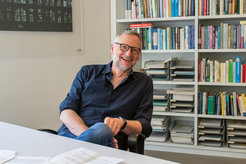The Unread Stasi Files
Center for Adaptive Rationality & Center for the History of Emotions
How did you come up with the idea for the joint research project?
Ralph Hertwig: I’ve been working on the phenomenon of deliberate ignorance for several years now. According to Aristotle and other great thinkers, humans have a boundless thirst for knowledge. But there are countless examples of people making a conscious decision not to know. And having watched films like The Life of Others (Henckel von Donnersmarck, 2006), I began to wonder what would happen if I had a Stasi file. Would I want to read it or not? That’s when I approached Dagmar Ellerbrock, who was then at the Center for the History of Emotions, with the idea of studying deliberate ignorance in the context of the Stasi files. Her response surprised me…

Dagmar Ellerbrock: …I was skeptical at first. The politics of memory holds a central place in historical research—particularly in Germany, where confronting a violent past is considered to be a crucial element in establishing stable democracies. Despite that, there have been calls—most prominently from the right of the political spectrum—to move away from research into the Holocaust and World War II. My concern was that research on a behavior that consists in closing one’s eyes to history could have this kind of apologetic potential.

Ralph Hertwig: It certainly wasn’t my intention to justify or excuse deliberate ignorance. As a behavioral scientist and psychologist, I’m interested in understanding the motivations behind people’s behavior. And individual behavior may well influence collective memory culture, and vice versa. We agreed on that. By gradually coming to understand each other’s approaches, we were able to bridge the gap between our respective terminologies and conceptual models, and ultimately develop a research design that tapped into both disciplines.
Dagmar Ellerbrock: After hearing a radio interview with union leader Claus Weselsky in 2012, any worries I had that the research might be used for apologetic purposes were finally laid to rest. Weselsky mentioned that he had a Stasi file, but didn’t want to read it—and the reasons he gave were exactly the ones Ralph had hypothesized. That’s when I understood that we were dealing with an under-researched phenomenon that was worthy of investigation for a number of reasons. I wrote to Ralph the very same day to say that I was on board.
What challenges did you face when you joined forces?
Ralph Hertwig: Our first question was how common the phenomenon actually is. Might it only apply to a small minority of former East Germans? The problem is that neither we nor the Stasi Records Office knew how many files there are and how many people they cover. Since the files were opened in 1991, over two million people have accessed their file. But a back-of-the-envelope calculation suggests that even more people have not done so.
Dagmar Ellerbrock: On top of that, investigating something that people don’t do presents a huge methodological challenge. You need to find ways of bringing to light things that are documented only indirectly. We invested a lot of time in the study design and had some intense discussions. As a psychologist working with quantitative methods and a historian taking a cultural historical approach, our approaches were quite different.
So how did you proceed?
Dagmar Ellerbrock: We decided to combine in-depth biographical interviews in the oral history tradition with quantitative methods, in this case surveys. We held an evening event at the Deutsches Hygiene Museum in Dresden, where we presented our project. We planned it as a citizen science evening; the attendees were able to give feedback on our design, suggest further reasons for not reading one’s file, and volunteer to participate in interviews. There was a huge amount of interest!
Ralph Hertwig: Based on this feedback and our discussions, we developed a questionnaire covering the various reasons that seemed to play a role in people deciding not to read their file. We then used various channels to recruit people who were willing to talk about their reasons for not reading their file. We sent the questionnaires to this pool of volunteers and received 134 replies. We conducted in-depth biographical interviews with 22 of them. In addition, we conducted a larger, representative survey of 2,317 respondents to get a better idea of how many people believe they have a Stasi file and how common the various reasons for not reading it are.
What did you find out? Why don’t people want to read their files?
Ralph Hertwig: There are basically four main reasons. The first, which we have also seen in other contexts, is to regulate emotions. Respondents anticipated that reading their file would lead to negative emotions. They were not sure that they could live with the anger or disappointment of knowing they had been spied on by someone they knew. This is related to the second reason: Some felt that the files are “no longer relevant,” since the past cannot be changed. A third reason relates to people’s self-concept. Respondents who were committed to the German Democratic Republic (GDR) and its worldview argue that the Stasi is not representative of the GDR as a whole and criticize how East German history was portrayed by West Germany. From their perspective, consulting their files would be an endorsement of the West German interpretation, which they reject. Fourth, many respondents raised concerns about trust and their ability to carry on functioning and trusting others after reading their file.

Dagmar Ellerbrock: A final reason, albeit one that wasn’t mentioned as often, was a kind of criticism of the source material. Some respondents questioned the value and credibility of the information contained in the files. This touches on a central methodological challenge for historians: We are always careful to check the accuracy and value of a source, as well as the underlying contexts and interests. Official files—be they secret service files, government files, or criminal records—always present a specific perspective. For me, it was interesting to see who cited this reason for not reading their file, as it suggests a desire to retain control over their own personal history and interpretation of events, rather than ceding that control to the Stasi.
Is it possible to say who is more likely to read their file?
Dagmar Ellerbrock: For people who experienced trauma and violence, reading the file is a necessary and important step in being able to move on with their lives. Our research confirms that. And it validates the decision to open the files to the public. But it’s important to remember that reading one’s file can also be a painful experience—especially for people who feel obligated to read it in order to start legal proceedings to seek compensation or justice.
Ralph Hertwig: Experience of victimization is a good predictor. People who faced severe hardships in the GDR are much more likely to say that they want to liberate themselves from that painful experience by reading their file. For those who did not experience harsh oppression, in contrast, accessing the file may be perceived more as a threat for the reasons we have mentioned.
What were the benefits of working together?
Ralph Hertwig: For me, it was a great learning experience to see just how illuminating the in-depth interviews were. It was only through the interviews that we really came to understand what was behind some of the reasons given. Take the example of relevance. One respondent was adamant that their file had no relevance for them because there was no way of changing the past. But the interview showed that the anticipated content of the file was anything but irrelevant because of its potential emotional repercussions.
Dagmar Ellerbrock: I also see that as a huge interdisciplinary gain. The oral history interviews added background, layers of meaning, and a first-person perspective to the quantitative surveys. For example, there are generational differences that reflect relationships to former East Germany, with the younger generation showing an interest in the files of their parents and grandparents. In other words, whether people want to know or not can change—not only on an individual level, but also on a societal level. At the same time, it is only possible to examine a limited number of files and individuals in such depth. Our combined approach also allowed us to gauge the frequency of the various reasons people gave for not accessing their files. Above all, our interdisciplinary mix of methods and levels of analysis enabled us to consider both individual behavior and collective processes and to examine their mutual impact in a highly productive way.
What are the implications of your findings for societal transformation processes?
Dagmar Ellerbrock: The history of emotions has been largely overlooked in the study of the Peaceful Revolution and East German history. Transformation processes are always massive shaming processes. Our approach allows us to explore how people cope with these experiences and the shame involved. Moving from one society to another essentially means dismantling the emotional and knowledge structures of one society and replacing them by new ones. What was once taken for granted is suddenly no longer acceptable. People respond to this shaming process in different ways. Some feel liberated by it, others disoriented. Engaging in deliberate ignorance by not reading your Stasi file is a strategy for dealing with those emotions—and one by which individuals can moderate the pace of historical transformation. For me, that’s fascinating: It’s almost like an accelerator that allows people to control how fast change occurs. Our research shows that deliberate ignorance has multiple functions: It can accelerate or delay change and play an active role in shaping it. This perspective offers a new way of understanding deliberate ignorance, not just as negation but as a productive factor in transformation processes.
Ralph Hertwig: Many societies go through this transformation process. Ultimately the question is: How can we organize knowledge cultures to best manage this transition process? It’s an exciting question that has yet to be answered. Understanding the interplay between the collective and individual levels can help shed light on the issue.
And your conclusion…
Dagmar Ellerbrock: Our research project demonstrates the value of drawing inspiration from other disciplines. That can mean using the models and terminology of another discipline to address issues that your own discipline doesn’t have the tools to deal with. Or seeing the findings of your own discipline from a new perspective.
Ralph Hertwig: I agree with Dagmar and would like to add one more thing: Understanding deliberate ignorance in the context of the Stasi files required us to have a healthy amount of curiosity. Both wanting to know and not wanting to know seem to be part of the human condition. Our efforts to understand the rationale and reasons for each have led to exciting answers—and our shared curiosity was the key.
* A file of reports collected by the East German Ministry for State Security.
Interview adapted from the German podcast “111 Kilometer Akten” (111 kilometers of files) by the Stasi Records Archive.
Research Project in Brief
Topic: Deliberate ignorance and transformation processes
Researchers: Dagmar Ellerbrock (Chair of Modern and Contemporary History, Technische Universität Dresden), Ralph Hertwig (Director, Center for Adaptive Rationality, MPI for Human Development)
Duration: 2017–ongoing
Funding: Max Planck Society and Technische Universität Dresden
Publications


